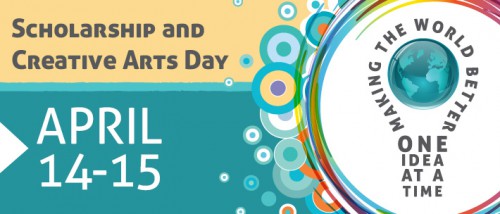Scholarship and Creative Arts Day (SCAD), started in 2007, is a two-day event in which Elizabethtown College students present research, participate in panels and showcase their creative talents. This year, 93 faculty and staff mentors worked with almost 400 students who are participating in SCAD-related activities. They represent 19 academic departments.
After the opening ceremony at 5 p.m. Monday, April 14, in Gibble Auditorium, SCAD events continue with the Peace Education Symposium, the Occupational Therapy Graduate Research Symposium and the student art show and showcase music recital. Tuesday is filled with presentations and panel discussions; it rounds out in the evening with a keynote presentation and performance from Emmy Award-winning musician Peter Buffett.
Debra Ronning, lecturer in music and director of keyboard studies, said the student recital is an important aspect of SCAD because it provides an outlet for fine and performing arts students to showcase their work. Auditions for the selective performance were held in February, she said. A three-member faculty committee selects high-performing students who represent a variety of instruments and abilities. Dr. Donald Kraybill, distinguished college professor and senior fellow in the Sociology and Religious Studies departments, also takes preliminary steps to make sure his students are prepared to give the best presentation possible at SCAD.
[SCAD is] a great way for students to practice their professional skills, and it supports a variety of student achievements.”
Kraybill, who mentored more than a dozen presenting students, prepares his mentees well in advance to ensure that their research is correct, their slides are appropriate and their overall presentation is aesthetically pleasing. Kraybill said he puts such strong emphasis on perfecting student’s presentations because students have no idea how many people will be in attendance—and who will be in the audience. There may be parents, faculty members, community members or alumni who are in large leadership roles at their organizations. For this reason, he said, it is important that students feel confident about their research and present themselves in a strong, professional manner.
“SCAD is an excellent program,” Kraybill said. “It’s a great way for students to practice their professional skills, and it supports a variety of student achievements. I’m really delighted that we have it.”
Not only does SCAD help students hone their professional skills, it allows audience members to engage with presenters. That’s why, every year, Dr. Oya Dursun-Ozkanca, associate professor of political science and director of the international studies minor program, looks forward to the panels.
“Panels receive a lot of interest from the campus community,” she said. “People always ask thoughtful questions.” Dursun-Ozkanca’s students take part in two panels, in which students defend their capstone research projects. From topics, such as comparing different countries’ economies, religions, courts and human rights, her students look forward to feedback from the campus community.
While Dr. Dursun-Ozkanca’s students are tackling the difference between cultures, the Engineering Department will be battling to conserve the environment. In the sustainability symposium, organized by engineering faculty members Dr. Tomás Estrada and Dr. Joseph Wunderlich, engineering students showcase green engineering and sustainability projects. Estrada said the symposium focuses on “designing and building in a way that has a positive impact on the planet.” Other engineering majors will present senior engineering projects or launch apples using trebuchets in the track’s in-field during the annual apple chunking contest.
To see a full list of SCAD performances and presentations, view the program online now.


